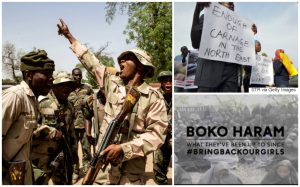Newspaper Article 16/04/2015
Boko Haram is a terrorist group based and active in north-east Nigeria. It also operates in areas of Chad, Cameroon and Niger. The group was founded in 2002 by Muhammad Yusuf, a charismatic Nigerian cleric who called for a pure Islamic Nigerian State. Boko Haram violent uprising and radicalization has increased after 2009 execution of its founder Muhammad Yusuf. Since 2009, it has launched overt military operations to create an Islamic state in West Africa and in 2014 declared caliphate in areas under control. Presently, it is led by Abu Baker Shekau and comprise of roughly 7,000 -10,000 members. US department of state has declared the group as terrorist since 2013 and pointed out its foreign links with Al-Qaeda offshoots in West Africa and with few extremist groups of Mali. Recently, Boko Haram has pledged alliance with ISIL or ISIS. This symbiotic relationship holds dual advantage i.e. transforming Boko Haram’s regional campaign into broader global spectrum and provision of large funding, propaganda, arms ammunition and logistics. Boko Haram incursions into peripheral areas of Chad, Niger, Cameroon and IS claim for a Caliphate land shows similarity of their militant agendas of territorial expansionism, thus making its inclinations towards IS as a logical move.
Boko Haram promotes stark version of Islam that makes any political or social activity associated with the West forbidden. The term “Boko Haram” itself means Western Education is forbidden. Despite government’s state of emergency since 2012, there is no marked control of the situation due to official corruption and Nigerian military inefficacy. Even the state elections scheduled to be held on February 1st this year had been postponed till March 28th because of internal political violence led by Boko Haram. During election campaign, the former President Good luck Jonathan had announced that anti-terrorist efforts had been stepped up. The Nigerian military had acquired new weapons from former Soviet Union and South Africa. He believed that Boko Haram will be routed out in a month and would finally be decisively defeated. He wanted to prove government’s capacity to deal with the intractable insecurity situation and to gather the vote bank. But the Boko Haram threat continued to loom before and during elections.
The 2014 Boko Haram’s kidnapping of more than 300 school girls from Chibok and protracted six-year insurgency had alarmed the international community. Its extra-regional ambitions are apparent from its alliance with IS. It has no more remained a regional threat but a global enemy. Thus, in order to combat Boko Haram, five African nations, Benin, Cameroon, Niger, Nigeria and Chad have pledged to fight Nigeria’s Boko Haram as a part of African Union’s (AU) regional effort. These countries have deployed around 8,700 military troops, police and civilians for this purpose as a Multinational Joint Task Force (MNJTF). According to media reports, in last few months the military had recaptured around 11 out of 14 districts from Boko Haram by collaborating with these neighbouring countries. The military had successfully liberated the town of “Gwoza”, the capital made by militants and was renamed as “Daarul-Hikma” by militants and other crisis ridden north eastern states of Borno, Yobe, Adamawa under emergency rule since 2013. However, analysts believe that Boko Haram militants are on a run and have retreated for the time being to strategize themselves, knowing that the new leadership of Buhari will be hard on them.
As the brutal attacks by Boko Haram constitute serious threat to international peace and human security, the United Nations Security Council (UNSC) has urged Economic Community of West African States (ECOWAS) and Economic Community of Central African States (ECCAS) to adopt joint strategy and comprehensive approach to combat Boko Haram. It has welcomed Joint (ECOWAS-ECCAS) experts meeting in Douala, Cameroon on 2nd April, as a step of enhanced co-operation to fight Boko Haram. Earlier a summit of the leaders of Central and West Africa had been scheduled to be held at Malabo, capital city of Equatorial Guinea on April 8 to examine region’s campaign to defeat Boko Haram through concrete plan and thorough co-ordination of the military strategy, which has been cancelled or postponed due to reasons unknown.
Despite such regional and international efforts, it is worth noting that the AU backed MNJTF may get well the institutional framework to operate but the real action to tackle Boko Haram requires more practical and effective military and political commitments by Nigeria itself.
Recently, General Muhammadu Buhari has won the Nigeria’s general elections 2015 against President Goodluck Jonathan by 2.5 million votes. In 2013, Boko Haram named “Buhari” as a preferred negotiator but he rejected the offer. Later, because of his fierce criticism of Boko Haram, he was targeted in 2014 in an assassination attempt. Now after winning the Presidential elections, Buhari has announced that Boko Haram will soon know the strength of collective will and his administration will spare no effort to tackle the Boko Haram insurgency.
The prevailing challenges for the Nigerian government are poverty, corruption, low socio-economic development and militant’s insurgency. The public expects Buhari to be more pragmatic and not solely relying on military solution to deal with Boko Haram. His political and military background, great deal of local knowledge and personal links to north-eastern Nigeria makes him a more formidable opponent against Boko Haram. He has pledged to restore security, address socio-economic issues and to return military operation led displaced people to their homes within next six months. It is hoped that the new leadership of Buhari will make better anti- insurgency measures and adopt rational strategy towards Boko Haram to restore peace and stability in Nigeria.
The article was published by Pakistan Observer on April 16,2015, The Daily Patriot on April 10,2015 and as a Letter to Editor in Express Tribune on April 14,2015.
Disclaimer: Views expressed are of the writer and are not necessary reflective of IPRI policy.


